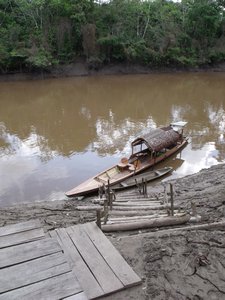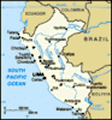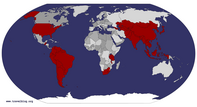Advertisement
Published: August 4th 2010

 River transport
River transport
Small dugouts are best for the river wildlife and water, small long boats with single motors like this one are second best and speed motor boats are the worst.As this trip comes to an end, I decided to write a post on traveling with a conscience - i.e. how to have a good time traveling without ruining the beautiful things you came here to see, whether that refers to a pristine lake or a rural, untouched-by-modern-society agricultural community.
So here are some points that I picked up that might help you make decisions as you travel - this post is specifically for other travellers but might be interesting to non-travellers as well. Also, it might get a little ranty - I apologize for that, but its an issue I think a lot about and I have a lot to say.
The secret is out and has reached even the most bare-bones and guiltless agencies all over the world - green is in. You´ll see signs in every language promising ecotours, environmental trips, and planet-friendly excursions alongside community or local guides and ´home stays´. While this is undoubtedly a good thing and it means there is an awareness that we can´t tramp around the world mucking it up as we go, it doesn´t actually mean every company with a green leaf on their store front actually cares about

 Illegal Zoo
Illegal Zoo
When our taxi-boat driver offered to take us to a zoo that had many animals, we initially got excited. When they put a tree sloth in my arms, I got really excited... when I thought about this again and realized the bare, small cages for the animals - I realized that supporting this zoo was wrong and probably illegal. We left within ten minutes and would not pay. the environment or local community. Its much easier to use toxic paint to put that leaf there and wash your brush in a nearby stream than it is to run a tourism agency that leaves no negative impact on the world it tours.
Before checking your guidebook, asking the questions, getting references - you need to actually think about the environement you are in and what it means to leave no negative impact. As I´ve asked friends in New Jersey before - is your vegan cheese still vegan if it takes an eighteen wheel, deisel-burning truck overnight cross country from california and hits a deer on the way? In other words - if your Indian guide promises that they treat the elephant nicely, therefore you should take him for a ride - think about it... What is nicely? Is it nice to capture an animal from the wild and paint it with toxic paints and beat into submission so tourists can ride it back and forth? This isn´t a blog post about all the things you wanted to do on your trip but can´t, those were just two negative examples. For example, horsetrekking on a well treated horse is

 Buttery Farm
Buttery Farm
This butteryfly farm not only works to help support butteryfly reproduction and sustain their populations, but also rescues animals from poachers, markets and certain death (i.e. after their parents have been killed at a young age in the wild). It also allows you to see incredible animals, up close, guilt free (the treatment of the animals is much better). much more enjoyable than on a broken, sick and sad horse - the horses are happier and so are you.
The same thing goes for community tourism - booking a tour in the nearest city means most of your money goes to a city-dweller and your trip will most likely include a chance to photograph ´the native´ for a fraction of the cost. Compare to taking transport to the community, finding a community-run organization or just speaking to a real person or family, asking if you can spend a night - the trips practically don´t compare, honestly. I've done both - and meeting a family, getting to know them, eating in their kitchen and handing them money directly is a more enriching experience for the traveller and better financially for the family. And it might be nice to pretend its not about money and they really want to meet random travellers (which might be true) but everyone´s got to eat and this way, they eat more.
Nonprofits are more trustworthy (people who stand to make a profit are more likely to lie), references are helpful, guidebooks can usually give you a good hint or can say if an

 A rescued jaguar
A rescued jaguar
Fed a mix of meat and wild animals, as to keep up his hunting instincts in case they feel they are able to release him back into the wild.organization seems shady - but there is no substitute for thinking for yourself. Speak up - if you choose an agency, ask them how much the host family will make per night. It is your money, you should not be afraid to ask these questions. Tell your agency that you prefer if your guide eats dinner with you - not before or after or away from you, as this sometimes means he will eat nothing. Ask about the effects your trip has on the environment - it sounds like a nerdy or hippy thing to say, but if you are going camping to enjoy a stream and leave a garbage bag behind, there is a problem there. If your tour operator has no answer for you, they probably haven´t considered it and this is also a problem. Even if you decide to go with this operator, at least you have asked a question. You would be surprised how few travellers it takes to raise awareness. If you ask the question and are unsatisfied with the answer, let them know. They may not care about the environment but they care about your business, so use your cash wisely. There is power

 Market Sale of Turtle meat
Market Sale of Turtle meat
Turtle meat is illegal and is still sold in markets and appears on menu - find out what animals are illegal in your area and don't buy it in the market or order it from a menu.there.
On money - and this is a tough truth for any shoestring traveller, but something that must be included here - choosing the cheapest tour you can possibly find is not always the best idea. You may already be thinking 'yeah, once I had the worst dinner/least comfortable mattress/etc' but it also takes a toll otherwise. If you bargain with your city operator for your community homestay price, you can bet the loss will hit the community family, not his own profit. If you shun the most expensive horsetrekking operations for the barebones company, your horses are probably not fed well or given land to graze. I'm not saying you can't be cheap without hurting someone, its just an important aspect to consider - everything has a price. Try skipping the agency altogether - you'll be surprised how little a homestay and home cooked meals should actually cost. The better decisions can actually be cheaper also - win, win.
Sometimes though, if you are being honest with yourself - you might hit a wall with no way around. There is something you want to do in this special place and it is not good for the place

 Better than recycling...
Better than recycling...
Many places might not have recycling facilities but they still might collect organic waste as separate from inorganic waste.you are in, but it is a once in a lifetime and you want to do it. I don´t have advice for these situations - I can only say that I've been there plenty of times and gone both directions. In South Africa, shark-cage diving is all the rage in the waters off the south coast where great white sharks are a plenty. Its relatively affordable, can be done in a day trip and is usually without incident or safety risk. But the way these boats attract the sharks is with fish blood and guts, which trains the sharks to be dependent on given food and also lures them closer to the shore than they usually choose; in recent years, surfers have been dying in greater numbers as a result. But I don´t know of any other way to see a great white shark from a foot away and survive... I chose to go shark cage diving and, while I had a great time and saw some huge sharks, I still think about whether that was the right decision (Im not pretending I lose sleep over it, but its still in my thoughts from time to time).
On this

 Community-run tourism
Community-run tourism
Took this photo for the family who wanted to advertise their home stay option but didn't have a camera - I sent to Walter, an employee of Cedesos (the community organization helping them get set up for tourists). past trip in Peru, I read in my Lonely Planet guide about the islands of Peruvian Lake Titicaca - there are several islands and the effects of tourism over the decades has been devastating to the communities. Apart from the trash accumulating which is hardly mentioned, the communities have fought bitterly over tourists and even after thirty years of tourism, most islanders are poor and struggle for the miniscule wages they can make from the city-run tourist agencies. All of this and the guide book also reports that you can feel it when you are there - most of the visited islands are completely tourist ridden and tourism-centric. You don't visit a community to see a different lifestyle, you see local people selling tourist crap and pizzas (my words, not theirs).
Decades of thoughtless tourism ruined a beautiful place and thousands of tourists continue to flock there every year. The book makes a great recommendation of spending time in the small and rarely-visited communities around the lake, many of which have community-run tourism projects. They recommended a nonprofit organization devoted to helping the communities set up and run these types of tourism projects by giving microfunds to families so they can afford to build on an extra room and bathroom and run workshops on how to successful run a tourism operation. The idea is (1) to make sure that tourists viewing the community support that community at the same time and (2) limit the types of tourism to ones that the community is comfortable with - i.e. volunteer on a farm instead of take a van through the dirt road and photograph the farmers through your window. I chose this type of program and had a fascinating experience (read about it in a previous post).
I have no grandiose summation for this blog, I just wanted to use it to discuss some issues that have arisen for me while traveling and may come up for you - making the right decision on the spot is difficult unless you've thought about these things before, now you know what questions to ask and aspects to consider. If you have any specific questions or comments, please feel free to message me privately or comment directly on this post.
Happy Travels (for you and your host country!)
-Mark
Advertisement
Tot: 0.052s; Tpl: 0.014s; cc: 11; qc: 26; dbt: 0.0295s; 1; m:domysql w:travelblog (10.17.0.13); sld: 1;
; mem: 1.1mb










